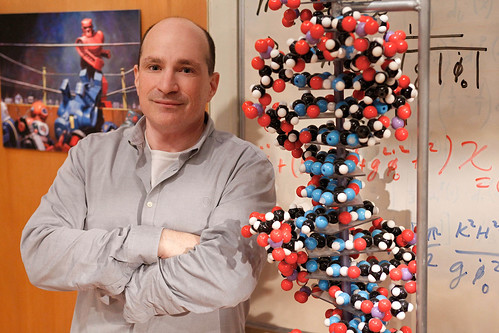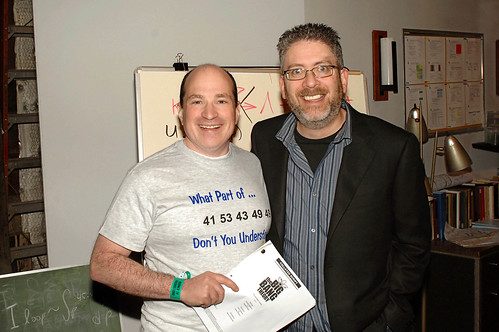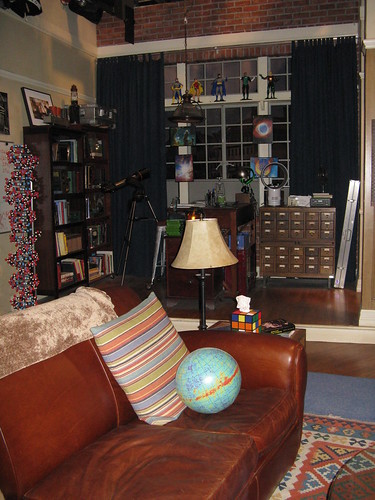Podcast: Astrophysicist to the Stars
- By Maggie Masetti
- May 21, 2012
- 1 Comment

When I first met Dr. David Saltzberg, he was rushing by with a big box of multicolored dry-erase pens. As the science advisor for the popular sitcom The Big Bang Theory, he provides the technical content for each episode’s whiteboards as well as the scripts and other aspects of production. While someone on the crew has already transcribed his notes onto the boards, David reviews them before each taping begins, checking for any errors. Sometimes he catches “a Greek letter or a serif out of place,” he told me. As his guest to an episode’s taping last fall, he came out to greet me in the audience, and then rushed backstage to finish his rounds and get ready for filming.
Click to listen! (8MB MP3, right-click to save)
Transcript (Text, PDF)

Pictured: Science Consultant David Saltzberg
Photo Credit: Warner Bros. Television Entertainment/Greg Gayne
©2011 WBEI. All rights reserved.
It’s this attention to detail that sets The Big Bang Theory apart from many other examples of science in popular culture – the show’s crew is dedicated to making science funny and accurate. When we interviewed co-creator Bill Prady about the show, he told us, “As best we can we want the stuff to be real and right, and everything from what’s on their whiteboards to what a lab looks like. So we have a consultant, who is Dr. David Saltzberg, from UCLA, who is an astrophysicist. And he helps us make sure that it’s right.”
David’s background is in astrophysics, specifically particle physics. He has worked on experiments at the Fermilab Tevatron, and, more recently, at CERN. During his graduate studies, he even spent a summer at Goddard, working with some scientists who still work here (such as Dr. Neil Gehrels, who we interviewed about Swift in 2009). It’s a small world sometimes, especially within a specific branch of science! Though his own work is rather focused, he consults on a variety of broader science topics for the show. I wondered how much of his own research ends up in the show, and he said it really isn’t much – though occasionally he’ll include something that a friend or colleague is working on, such as some of Sheldon’s work in the infrared. David’s real challenge is to incorporate truly cutting-edge science into the scripts, especially up-and-coming research that hasn’t hit the mainstream yet. When I asked for an example, he offered, “We put topological insulators in an episode, which you probably haven’t heard of… but I think you will!”
One entertaining overlap between David’s real-life scientific work and the characters’ fictional exploits occurred when the main characters went to the North Pole for a three-month expedition. David has been to Antarctica three times – it’s the opposite “end” of the Earth, but it provided him unique insight into doing science under such extreme conditions (you can listen to two Blueshift podcasts about some of Goddard’s Antarctic science). It also gave him the connections to obtain authentic cold-weather gear from the NSF’s Office of Polar Programs. When David’s own Antarctica adventures overlapped with one season and he missed three months’ worth of tapings, the writers kept asking, “Are you ever coming back?”
When the science falls outside of his area of expertise, David knows where to turn. “At UCLA, people are one call or one floor away,” he explained. Sometimes he has to work on content a bit more removed from his research, such as biology or medicine, and then he consults experts such as a friend at the Salk Institute or the show’s own Mayim Bialik (who has a PhD in Neuroscience, similar to her character’s PhD in Neurobiology). During the tapings themselves, David largely gets to enjoy the fruits of his labors – the script’s science is in good shape, the whiteboards have received any needed corrections, and he sits with the writers as the episode is filmed. He’s on-call for any science emergencies, such as a last-minute calculation or clarification of how something is pronounced. In one episode, he had a brief cameo as an extra in a cafeteria scene, but usually he’s behind the cameras.
Tapings also provide an opportunity for David to chat with the writers about future episodes – at any given moment, there are several episodes in various stages of production. Once an episode’s taping concludes, work immediately begins to prepare for the next episode’s taping, which is usually a week away. The schedule is intense, and they’re always looking ahead. David said, “If you asked me, ‘What was last week’s episode?’ – I probably couldn’t tell you.”

Pictured: (l-r) Science Consultatnt David Saltzberg, Executive Producer Bill Prady
Photo Credit: Warner Bros. Television Entertianment/Ron P. Jaffe
©2008 WBEI. All rights reserved.
Over the past five seasons, David has developed a close relationship with the crew. “Personally, I love working with the people here,” he said. “Independent of physics, it’s a fantastic crew to be around. I’ve learned a lot just working here.” Besides his work with the writers, other members of the crew turn to David with their own science questions. When an episode featured lunar laser ranging, he found himself fielding questions from the crew beyond the scope of the show’s science. David’s efforts help maintain the show’s balance between scientific accuracy and Hollywood comedy. “The biggest sin is to be boring,” he told me, “but if people want to know more, it’s just a Google search away.” The audience’s interest in the show’s science is evident from numerous blogs, wikis, and messageboards dedicated to discussing each episode’s science (including David’s own blog, The Big Blog Theory). During the taping, a member of the live audience said, “It makes it worth going to science class so I can understand all of the physics jokes!”
Maggie and I were thrilled to visit for another taping this season, and this time, we brought a microphone and talked to David after filming had ended. Enjoy the podcast!
More About The Big Bang Theory
If you’re just tuning in, in the course of writing a feature about the WMAP beach ball, we were invited to visit the set of The Big Bang Theory to take a picture of the one they had on set.
- The article that started it all has an interview with Britt Griswold, who designed the beach ball.
- Just use the Big Bang tag for all of Blueshift’s entries on “The Big Bang Theory”.
- We have more photos of Big Bang Theory set on our Flickr account, and you can also read about the NASA things we brought that were featured on the show.
- Our interviews with Scott London, propmaster and
Ann Shea, set decorator.
Credits:
| Host | Sara Mitchell |
| Guest | David Saltzberg |
| Interviewers | Sara Mitchell, Maggie Masetti |
| Editor | Maggie Masetti |
| Theme Music | Naked Singularity |
| Transcript | Maggie Masetti Sara Mitchell |
| Website Support | Maggie Masetti |
| Producer | Sara Mitchell |




Science is divine. The beauty of science lies in its dynamic nature. Once a theory is proven wrong, it won’t take a day to discard it and replace that with a new one.